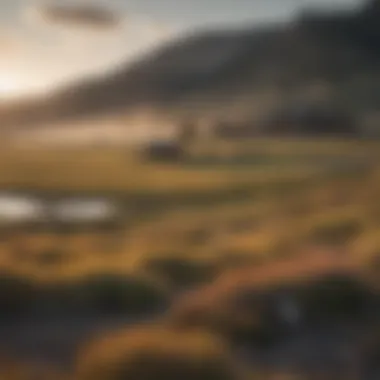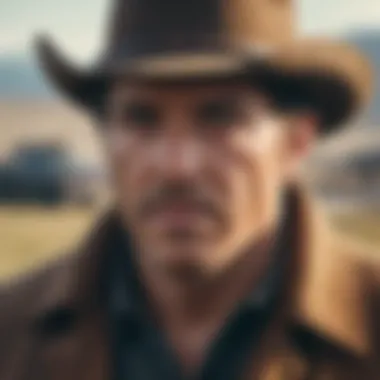A Deep Dive into Every Episode of Yellowstone Series


Overview of the Entertainment, TV Show, or Film discussed
Yellowstone is a television series that has captured the imagination of audiences since its debut. Created by Taylor Sheridan and John Linson, the show dives deep into the dramatic life surrounding the Dutton family, who control the largest contiguous ranch in the United States. Set against the backdrop of Montana’s stunning landscapes, it unravels the complexities of land, power, and family ties.
At its core, Yellowstone’s plot centers on John Dutton, portrayed by Kevin Costner, who fiercely protects his legacy from various threats including land developers, the government, and even his own family dynamics. The show first aired on the Paramount Network in June 2018 and has since garnered a significant following.
The series is not just a portrayal of life on a ranch; it serves as a commentary on modern issues interwoven with classic Western tropes. Sheridan's ability to blend personal drama with socio-political themes has refreshed the Western genre, making it relevant for a modern audience. Key figures like Wendy Moniz, Cole Hauser, and Kelly Reilly enrich this world with their compelling performances, adding to the show’s layered narrative structure.
Analysis and Critique
Yellowstone stands out not only for its gripping storytelling but also for its remarkable production quality. The cinematography by Ben Richardson brilliantly captures the rugged beauty of Montana, allowing viewers to feel as if they are part of this mesmerizing, albeit ruthless, environment. The direction often maintains a gritty realism, drawing the audience into intense moments that punctuate the broader narrative.
One note worthy aspect is the writing, particularly in dialogue, which rings true to the characters’ backgrounds while offering insight into their motivations and the conflicts they face. Comparatively, the show can be aligned with others like Hell on Wheels or Longmire, yet it carves its unique niche by demonstrating how old-world values clash with contemporary challenges.
Themes of loyalty, betrayal, and the struggle for power are ever-present, creating a darkly engaging tone throughout the seasons. Sheridan’s stylistic choices are evident, much like his earlier works such as Sicario, where moral ambiguity and family loyalty often collide, shaping a nuanced portrayal of characters.
Episode/Scene Breakdown
As we dissect each season, the distinct episodes unravel pivotal moments that illuminate character relations and plot developments. For instance, in Season 1 Episode 1, titled Daybreak, we witness pivotal introductions to main characters, with John Dutton’s authority being immediately challenged. Key events unfold that foreshadow deep-seated family issues and rivalries that will continue to grow.
Some other notable scenes include:
- The intense confrontation between the Dutton family and the livestock agents, highlighting the theme of landowner rights.
- The emotionally charged exchanges between siblings, particularly between Jamie and Beth, that reveal complex family dynamics.
- Moments of violence that underscore societal conflicts such as those occurring in the Native American reservations, reflecting real-life issues.
Each episode, scrutinized for its contributions, reveals how the series masterfully crafts an intricate web of relationships that enhances character arcs and adds to the overarching narrative.
Audience Reception and Ratings
From the get-go, Yellowstone has received positive reception from both critics and audiences. Rotten Tomatoes showcases a strong consensus with high audience scores, often reflecting the show's capacity to resonate with viewers' emotions and contemporary issues. Its popularity surged, making it one of the most-watched cable series in the United States.
Viewers appreciate the blend of drama with Western aesthetics, resonating strongly with them:
- Viewer Ratings: Many individual episodes have scored in the high 90s, indicating a strong connection.
- Critical Reviews: Major platforms such as Rolling Stone or The Hollywood Reporter often highlight the depth of the narrative and character exploration.
Yet, criticisms often arise around pacing and certain plot choices, which some consider to wallow in revealing rather predictable arcs in later seasons. However, the show's strength lies in its ability to remain engaging despite such critiques.
Recommendations and Finale
For both fans of classic Westerns and newcomers, Yellowstone offers a compelling mix of drama, moral questions, and striking visuals. If you appreciate intricate stories involving family, legacy, and socio-political undertones, this series is a must-watch.
In summarizing key elements discussed, the show's impact on modern Western storytelling cannot be overstated. Its blend of rich character development, relevant themes, and stunning cinematographic visuals make it a significant player in contemporary television. As Yellowstone continues to evolve, it promises to keep its audience engaged, longing for more insight into the complex lives of the Dutton family.
"Yellowstone is not just a show; it's a reflection of the old and the new, where every character's struggle signifies a larger narrative of survival and legacy."
Ultimately, this series positions itself as a defining testament to the genre's evolution and the complexities of human and ecological relationships.
Prelims to Yellowstone
The significance of Yellowstone in the realm of modern television cannot be overstated. As a cornerstone of contemporary storytelling within the Western genre, it captivates viewers with its compelling narrative and richly woven character arcs. The resounding popularity of the series reflects a collective yearning for a deeper exploration of the themes interlaced with the American frontier and the complex human emotions that reside within it.
Overview of the Series
Yellowstone, created by Taylor Sheridan and John Linson, premiered on the Paramount Network in June 2018. Unfolding on the backdrop of the awe-inspiring Rocky Mountains, the series centers around the Dutton family, stewards of the largest contiguous ranch in the United States. The patriarch, John Dutton, played by Kevin Costner, is a character steeped in traditional values yet beset by modern challenges.
The narrative weaves through issues such as land development, family loyalty, and the struggles between ranchers and stakeholders in the surrounding environment. Over its run, Yellowstone has evolved into a rich tapestry that not only depicts the beauty of nature but also the multifaceted dynamics of familial ties, governing authority, and survival.


Significance in Television Landscape
In a television landscape cluttered with reality shows and formulaic dramas, Yellowstone stands out like a beacon of quality. It has stirred both critical and popular acclaim, becoming a cultural phenomenon in its own right. This drama tackles complex socio-political issues, which resonate deeply with audiences today. It challenges viewers to ponder morality, authority, and the bone-deep instincts of its characters against the backdrop of a changing American landscape.
"Yellowstone is not just a show; it's a reflection of society's current struggles and aspirations."
The show deftly balances the nostalgia for traditional Western motifs with progressive themes rooted in contemporary societal debates, making it relevant beyond mere entertainment. By blending character-driven narrative with pulse-pounding conflict, Yellowstone not only captivates its audience but also elevates the genre, pushing boundaries and rethinking what Westerns can offer.
The Main Plot Arc
The backbone of Yellowstone isn’t merely a sequence of events; it is a complex and intertwining narrative that resonates deeply with viewers. The main plot arc stretches across themes of family loyalty, power struggles, and the rugged landscape of Montana, where the Dutton family’s ranch becomes both a sanctuary and a battlefield. This section aims to encapsulate the essence of the show’s core narratives, laying out the foundation upon which its characters build their lives.
At the heart of this narrative is the Dutton ranch, which symbolizes tradition and authority. Here, patriarch John Dutton's struggles reflect not just personal battles, but also broader themes such as generational conflict and the clash between old values and modern expectations. The location itself, with its vast openness and undeniable beauty, acts not only as a backdrop but as an active participant in the story, influencing character choices and setting the stakes.
Setting the Scene: Montana's Dutton Ranch
Montana's Dutton Ranch is more than just real estate; it is a character unto itself. The ranch stretches far and wide, with grassy plains and towering mountains that create a picture of idyllic pastoral life, yet its beauty coyly masks an undercurrent of tension. Its sprawling pastures tell tales of cattle drives and family legacies while also housing some of the most intense confrontations among characters. Given that the Dutton family operates a cattle ranch, every episode is suffused with imagery that evokes the honest but harsh realities of ranch life.
This setting serves as a foil to the chaotic human drama that unfolds. As one watches, it’s clear that the physical environment—dotted with fences and rustic buildings—mirrors the boundaries that characters try to maintain amidst their personal conflicts. The vast lands are both a haven and a trap, showcasing how the Duttons safeguard their heritage while grappling with external threats. Recognizing the importance of this location enriches one’s understanding of the interpersonal dynamics within the show.
Central Conflicts and Themes
The story thrives on a series of conflicts that simmer just below the surface. The primary theme revolves around survival, not only of the ranch but of the Dutton way of life. Each character embodies different facets of this struggle. John Dutton represents the unwavering patriarch, battling not only to preserve his family's legacy but to protect it from encroaching development and familial betrayals.
Interestingly, the conflicts extend beyond human nature. The ranchers' skirmishes with land developers and Native American rights create a compelling narrative. This tug-of-war illustrates a larger commentary on the consequences of modernization, where capitalistic greed often collides with cultural heritage.
The themes of loyalty and betrayal are woven seamlessly through character interactions. Beth’s fierce loyalty to her family contrasts sharply with Jamie’s constant struggle for identity and validation. These dynamics form an intricate tapestry that demonstrates the lengths to which individuals will go to protect their own.
Ultimately, the main plot arc in Yellowstone digs deep, exploring the essence of family, the inevitability of conflict, and the ever-present struggle between man and nature. As viewers traverse this rugged landscape alongside the Duttons, they are not just spectators but participants in a story that feels as vast and profound as Montana itself.
Character Profiles
In examining Yellowstone, it becomes apparent that the characters are not mere actors on a stage but living, breathing entities that embody the essence of the narrative. Through deep dives into their individual arcs, one can grasp the intricate relationships that both drive and define the storyline. The characters are the heart of the series, acting as reflective mirrors of larger societal and familial struggles. They bring forth the dilemmas of modern America, coalescing personal ambitions with the weight of tradition.
John Dutton: The Patriarch
John Dutton, portrayed with gravitas by Kevin Costner, is the cornerstone of the Dutton family. A man steeped in the traditions of the old West, he serves as a protector of the land and his family. John’s character is layered — at times a tyrant, and at others, a benevolent leader, he navigates a complex web of family loyalty and conflict. The struggles he faces often lead to ethical dilemmas, as he must choose between the well-being of his ranch and the welfare of those around him. His adherence to the values of the past, paired with the understanding that change is inevitable represents a nuanced view of legacy and responsibility in a rapidly evolving world.
Beth Dutton: The Fierce Advocate
Beth Dutton, portrayed by Kelly Reilly, emerges as a force to be reckoned with in a predominantly male-dominated landscape. Her fiery personality and unyielding spirit reflect the fierce desire to protect her family legacy while combating her own demons. Beth embodies the modern woman with ambition, often resorting to ruthless measures to achieve her goals. Yet, this fierce advocate for her family is not without vulnerability. The interplay between her warrior-like exterior and deep-seated emotional scars adds layers to her character, making her relatable and complex. Beth’s relationship with John sheds light on their shared values and divergent methods, making their dynamic both compelling and complicated.
Jamie Dutton: The Complex Antagonist
In the shadows of the Dutton legacy lies Jamie Dutton, a character who personifies the struggle between ambition and loyalty. Played by Wes Bentley, Jamie stands out as the sibling who constantly grapples with his identity in the shadow of his father. His thirst for power contrasts sharply with his desire for familial acceptance. Throughout the series, Jamie's moral compass spins in various directions — as he attempts to forge a path of his own, his actions often conflict with the family's interests. This duality marks him as both antagonist and victim, probing into themes of betrayal, ambition, and the quest for validation.
Rip Wheeler: Loyalty and Conflict
Rip Wheeler, played by Cole Hauser, stands as an embodiment of steadfastness within the turbulent world of the Duttons. Often seen as John’s right-hand man, Rip’s unwavering loyalty is both commendable and troubling. His history of violence and his protective nature could be interpreted as marks of a tragic hero. Rip’s character navigates a muddy moral landscape as he balances love, particularly for Beth, with the brutal demands of loyalty to the Dutton ranch. His journey reflects the age-old battle between love and duty, further complicating the relationships within the series.
"The strength of Yellowstone lies not just in the land it portrays but in the texture of its characters, each woven intricately with threads of ambition, loyalty, and moral complexity."
Episode Breakdown
The Episode Breakdown section is crucial for understanding the intricate layers of narrative and character development within 'Yellowstone.' Each episode acts as a building block, contributing to the overall structure of the series. By dissecting episodes, we unveil key themes, character arcs, and pivotal moments that resonate throughout the seasons. This approach allows viewers to appreciate the series' complexity and how subtleties in earlier episodes echo in later ones. It’s like unearthing treasures that enhance the viewing experience while providing context to characters’ motivations and conflicts.


In-Depth Review of Season One
In the first season of 'Yellowstone,' the groundwork is laid for everything that follows. Here, we are introduced to the Dutton family and their sprawling ranch, a character in its own right. The episodes dive into John Dutton's struggle to protect his land from developers and the challenges presented by a neighboring Indian reservation.
The tension is palpable as various players vie for control and influence. One standout element from Season One is how the narrative explores the concept of family loyalty against the backdrop of greed and ambition. The relationships among the Duttons — a complex web of love, betrayal, and obligation — are drawn sharply. Each episode creates an atmosphere of urgency, drawing viewers deeper into the emotional stakes.
Exploration of Season Two
Season Two escalates the drama significantly. Tensions reach a breaking point in both personal and external conflicts. The introduction of new characters, such as the charismatic but dangerous foe, adds depth and complexity to the plot. Here, viewers see how far the Duttons are willing to go to protect their legacy.
This season underscores the recurring themes of power struggles and family ties, as the Duttons face heightened threats. Important episodes reveal a darker side to characters previously seen as merely sympathetic. The stakes are raised, making viewers question morality and the lengths one would go for their family.
Key Developments in Season Three
In the third season, 'Yellowstone' further solidifies its place as a mainstay in contemporary television. The storyline becomes richer and more layered. Key developments include the rise of an unexpected alliance, pushing the Duttons into a new phase of challenges. The season artfully weaves in themes of survival and resilience while probing into the psychological aspects of the characters.
One cannot overlook the evolution of Beth Dutton, who transforms from a fierce but fractured individual into an unapologetic force to be reckoned with. This shift adds a new dynamic to the display of family loyalty and the cost of vengeance. Each episode of Season Three carves out its unique narrative while contributing to the broader tapestry of the series.
Climactic Moments of Season Four
By the time Season Four rolls around, the series has built a reputation for shocking twists and dramatic climaxes. This season does not hold back; it presents climactic moments that leave viewers at the edge of their seats. Major confrontations test the Duttons both as individuals and as a family unit. Significant episodes challenge viewers to reconcile their perceptions of justice and loyalty.
As various plots intertwine, some characters face their demons while others reveal hidden depths. Emotional and intense, Season Four underscores the weighty consequences of choices made in the heat of personal and familial strife. Each episode feels like a resolution and a new dawn, as the past continually influences the present.
"In the world of 'Yellowstone,' every choice has ripples. The journey is as much about the characters themselves as it is about the land they fight to protect."
Exploring these seasons episode by episode paves the way for a more profound comprehension of both the series' immediate thrills and the underlying themes that linger long after the credits roll.
Thematic Elements
The thematic elements of Yellowstone stand as the backbone of the series, weaving through the episodes and enriching the storylines in profound ways. These elements do not merely serve as side notes; rather, they intertwine with characters and plot arcs, providing audiences with a deeper comprehension of the underlying societal and emotional currents present in modern life. The careful depiction of themes such as the conflict with modernity, family dynamics, and the role of nature and environment fosters a relationship between viewer and story that extends beyond the screen.
Confrontation with Modernity
The tension between traditional ways and modern influences permeates Yellowstone. This series is set against the backdrop of Montana’s vast landscapes, juxtaposed with the encroaching hand of urban development and capitalist interests. The Dutton family embodies a struggle that many can relate to—holding onto legacy while facing the inevitable tide of change.
"Society moves forward, but the Duttons cling fiercely to their past."
This conflict manifests through various scenarios, such as land disputes, political maneuvers, and even the personal aspirations of characters like Jamie Dutton. He represents a bridge between traditional values and modern ambition, creating a subtle rift within the family. Viewers witness the profound impacts of gentrification, where the old meets the new, in settings that were once untouched. It’s a poignant reminder of how the push for progress often comes paired with loss, a reality that resonates with those who have grappled with similar issues in their communities.
Family Dynamics and Relationships
At the heart of Yellowstone resides a complex portrayal of family. The Dutton family is characterized by fierce loyalty alongside profound conflict. Their interactions encapsulate the beauty and dysfunction inherent in familial relationships. John Dutton, the patriarch, attempts to instill his values in his children, yet the road is rocky. The relationship between Beth and Jamie Dutton is particularly telling, filled with a cocktail of love, resentment, and rivalry.
In Yellowstone, the theme of family is not merely about blood relations; it’s also about chosen allegiances. Rip Wheeler’s commitment to the Duttons showcases how love and loyalty can transcend traditional family bonds. This complexity invites viewers to ponder their own family dynamics, highlighting how connections shape individual identity and choices.
The Role of Nature and Environment
Nature in Yellowstone is not just a backdrop; it acts almost as a character itself, exerting influence over the Dutton family and their narrative. The rugged landscapes of Montana symbolize both beauty and harsh realities. The show presents nature as a source of both conflict and refuge. Characters often retreat into the wild, seeking solace from the chaos of human relationships or the pressures of modern life.
The environmental struggles reflect pressing contemporary issues too, such as climate change and conservation. As characters face threats to their land and lifestyle, audiences are invited to consider the real-world implications of land ownership and environmental stewardship. Nature’s dual role emphasizes the symbiotic relationship between humanity and the environment, compelling viewers to appreciate the delicate balance each character navigates.
In summary, the thematic elements encapsulated in Yellowstone serve not just as entertaining plot devices but as reflections of societal truths. The confrontation with modernity, intricate family ties, and the significance of nature provide a multifaceted lens through which to understand both the characters and the world they inhabit. As the series continues, it leaves viewers with questions—about family, society, and the ever-evolving landscape of existence.
Cultural and Social Commentary


When examining Yellowstone, understanding its cultural and social commentary becomes inherently important. The series not only crafts an evocative narrative but also serves as a mirror reflecting issues that resonate deeply within American society. Through its portrayal of life on a ranch, it provides insight into rural dynamics, family ties, and the intricate relationships between humans and the land they inhabit. This aspect of the show invites viewers to ponder broader themes such as land ownership, identity, and tradition, which have long been staples of American culture.
The show acts as a socio-political lens, offering perspectives that challenge viewers to think critically about the realities faced by those living in the American West. This context fosters a deeper appreciation of the narrative, while simultaneously touching on contemporary issues.
Portrayal of the American West
Yellowstone gives audiences a nuanced portrayal of the American West, capturing not just the idyllic landscapes but also the complex social fabric that underpins these regions. It reveals the grit and determination of ranchers and the daily struggles they engage in to hold onto their way of life. With its vast, rugged settings, the aesthetic is rooted in a romanticized view yet also stays grounded in realism.
The program doesn’t shy away from depicting the harsh realities of rural life. For instance, while the beauty of Montana is captivating, the harsh winters and economic challenges are depicted without sugarcoating. Characters like John Dutton embody the rugged individualism often admired in Western folklore, yet their stories are laden with moral dilemmas and conflicts that modern audiences can relate to.
Here are notable elements of this portrayal:
- Land Ownership: The fierce battles over territory reflect tensions within communities and between different factions, presenting land as both a symbol of power and a source of conflict.
- Cultural Clashes: The interactions between ranchers and indigenous tribes, or the urban influences encroaching on rural life, demonstrate the complexities of modern American identity.
- Tradition vs. Change: The series often raises questions about preserving the old ways amidst the pressures of progress. This dichotomy is presented through character arcs and their personal choices, illustrating a broader cultural conversation.
Socio-Political Issues Addressed
In tackling socio-political issues, Yellowstone paints a vivid picture of the contemporary challenges facing America. It adeptly weaves topics like government intervention, environmental concerns, and social justice into its narrative in a way that engages rather than alienates.
For example, the depiction of land development confronts the impact of capitalism on community life, revealing how corporate interests often conflict with local values. The character of Beth Dutton, with her fierce advocacy for her family and their land, underscores the struggle against external pressures that threaten traditional ways of living.
Key issues addressed include:
- Economic Disparities: The show highlights issues around wealth distribution, especially in relation to land ownership where the stakes are often high.
- Indigenous Rights: By incorporating native perspectives, it acknowledges historical injustices and current reparation discussions, framing the narrative within a context of equality and recognition.
- Political Turmoil: Themes of systemic corruption and the interplay between politics and personal interests are depicted through the actions of various characters, providing a critical examination of governance in rural America.
"Yellowstone often serves as a lens through which viewers can assess the delicate balance of power, identity, and the deep-seated conflicts that shape the American landscape."
Viewer Reception and Impact
The viewer reception and impact of 'Yellowstone' hold a critical place in understanding its place within modern television. Beyond just enjoying the show, audiences engage with it on many levels—from sheer entertainment to the examination of deeper societal issues. The narrative weaves together themes that resonate strongly with viewers, ultimately leading to discussions that stretch well beyond the screen.
Critics' Reviews and Awards
Critics have had a varied yet mostly positive response to 'Yellowstone,' often highlighting its writing, character arcs, and cinematography. Many reviews have made note of how the series revitalizes the Western genre—a genre that had, for a time, almost faded from mainstream popularity.
- Acclaim for Performance: Kevin Costner's portrayal of John Dutton has received particular praise, with critics noting his ability to imbue the character with depth and complexity. This performance earned him nominations in various award shows, showing the industry’s recognition of his talent.
- Writing and Direction: The episodes are often commended for their sharp dialogues and multifaceted plots. The series has garnered a reputation for its gritty storytelling, which refuses to shy away from the realities faced by its characters. This has led to nominations for writers and directors, underlining the creative strength behind the script.
- Visual Achievement: The breathtaking shots of Montana also don't go unnoticed. From sweeping landscapes to intimate portrayals of ranch life, the visuals have won awards and heightened audience appreciation for the aesthetics of the show.
"'Yellowstone' is more than just a series; it’s a mirror reflecting the struggles and aspirations of modern America."
- Television Critic
Fan Enthusiasm and Community Responses
The community built around 'Yellowstone' reflects the show's ability to touch hearts and spark conversations. Fans are not simply passive viewers; they actively engage with the series in diverse ways.
- Social Media Buzz: Platforms like Reddit and Facebook have become hubs for discussion. Fans share insights, theories, and predictions, leading to lively debates and camaraderie among viewers.
- Life Beyond the Screen: The impact of the show can be seen in the rise of merchandise, conventions, and fan clubs. It's not uncommon to see gatherings where fans unite over their mutual admiration for the story and its characters, sharing everything from their favorite lines to theories about the next season.
- Cultural Reflections: There’s a notable conversation happening around the themes presented in the series, such as land ownership, environmental concerns, and family loyalty. Fans often reflect on these themes in real-life contexts, connecting the dots between the show and their own experiences.
The End
In summary, the conclusion serves as a crucial reflection point for the entire analysis of Yellowstone. It distills the essence of the series while allowing the audience to grasp the deeper layers that the show presents. Through the journey of each character, the evolving narratives, and the overarching themes, this article has aimed to unearth the multifaceted nature of the series.
Summative Thoughts:
When we step back and look at Yellowstone as a whole, it's clear that the show does more than just entertain. It tells the tales of struggle, legacy, and the continuous clash between personal desires and familial duties. The Dutton family's saga, woven through the threads of loyalty and betrayal, mirrors real issues faced by many. Its portrayal of the American West isn’t just nostalgic; it invites viewers to question their own values and relationships within their families. It’s a stark reminder that every family has its skeletons, and the weight of heritage can be both a gift and a curse.
"I’ll do whatever it takes to protect my family, even if it means sacrificing my own happiness."
The elements of violence, love, and tragedy echo the complexities of life itself. Each episode adds layers to the understanding of what it means to be part of a family and the lengths one will go to safeguard their bloodline.
Future Implications for The Series:
Looking ahead, Yellowstone holds immense potential for exploring new arcs and developing existing characters further. With the foundation that’s been laid in the previous seasons, future seasons could delve deeper into the ramifications of the choices made by the Duttons. New conflicts might emerge as external pressures increase—the threat of urban expansion, shifting political landscapes, and environmental concerns could become more pronounced.
Moreover, spins-offs like 1883 already indicate that the show's universe can expand, offering insights into the historical context of the Dutton legacy. As viewers become more invested in the dynamics of this family, there is also room for exploring themes of redemption, forgiveness, and the impact of modernity on traditional values.
Ultimately, the future of Yellowstone remains promising, with its ability to blend the old Western genre with contemporary issues, keeping audiences engaged and reflecting on what truly matters in life.







